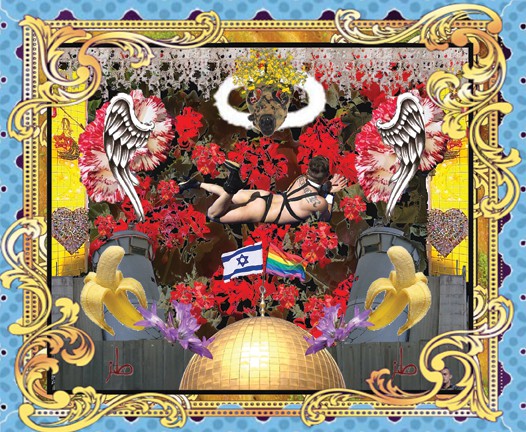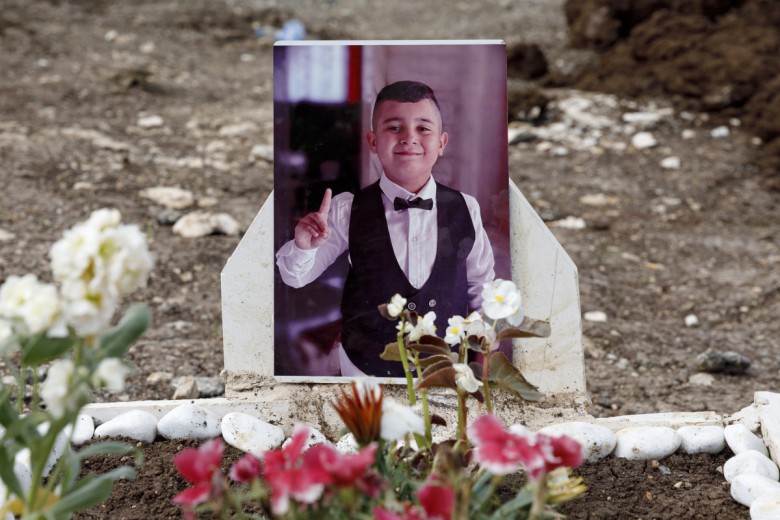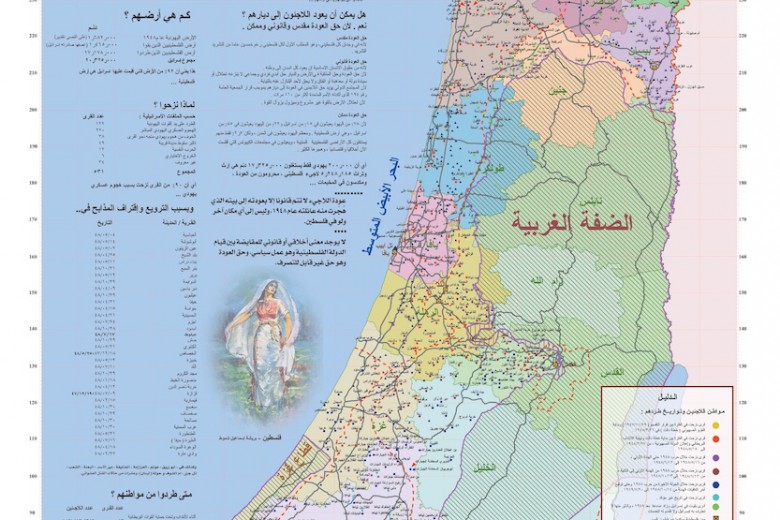
This spring, Israel’s tourism department announced plans to invest 11 million shekels (C$3.75 million) on tourism initiatives for Tel Aviv’s Pride Parade. One plan was to fly international tourists to Israel in a rainbow-painted plane, though widespread protests eventually forced the government to drop that particular initiative.
This high-profile campaign came in the shadow of the news that, just a few months earlier, in February 2016, the Knesset had voted down several bills for gay rights, including a bill that would grant the same bereavement rights as heterosexual couples for widows or widowers of Israel Defense Forces (IDF) soldiers in same-sex relationships, a ban on conversion therapy for minors, and a bill to train health professionals on gender and sexuality issues. Not only were those bills voted down, but LGBT support organizations also revealed that the state delivered only a fraction of the funding they had promised.
LGBT activists called for the cancellation of Tel Aviv Pride until Israel shows a commitment to LGBT rights through substantive legal and legislative equality. They also argued that the Israeli government was using high-profile tactics like the rainbow plane to divert attention from its occupation of Palestine. These strategies fall under the rubric of pinkwashing.
The Toronto chapter of the group Queers Against Israeli Apartheid (QuAIA) has been on the forefront of the international struggle against pinkwashing, until it disbanded last year. After the formation of QuAIA in 2008, pro-Israel groups (and, for a time, some Toronto city council members) tried to silence them by framing the group’s language around “apartheid” as dishonest, and threatening to withdraw thousands of dollars in grant money to prevent QuAIA from marching in the Toronto Pride Parade.
For its part, QuAIA opposed the strategy of pinkwashing, a term that the group Pinkwatching Israel explains is a strategy to “transform public perception of Israel from an Apartheid settler state to a harmless, liberal, gay-friendly playground by juxtaposing this false image with a portrayal of Palestinian and Arab societies as backwards, repressive and intolerant.”
This isn’t to say that all Middle Eastern states are absolved of their own homophobic public policies that perpetuate violence, but pinkwashing is a tactic that specifically relies on exaggerating the progressive nature of gay rights in Israel and positioning homophobia as a phenomenon that occurs only in Arab states. It erases not only the fact that homophobia exists in all hetero-patriarchal societies, but also that homophobia exists alongside (and indeed upholds) racial hierarchies.
Israeli pinkwashing is one practice of a larger, widely exploited practice called “homonationalism.” Rutgers University associate professor Jasbir Puar uses the term to describe a framework that legitimizes imperial states through “an embrace of a sexually progressive multiculturalism justifying foreign intervention.” This frame, Puar argues, sheds light on “the complexities of how ‘acceptance’ and ‘tolerance’ for gay and lesbian subjects have become a barometer by which the right to and capacity for national sovereignty is evaluated.”
Understanding how state formulation and legitimacy rests on homonationalism means understanding “how [liberal LGBT] rights discourses produce narratives of progress and modernity that continue to accord some populations access to citizenship – cultural and legal – at the expense of the delimitation and expulsion of other populations.”
Tactics of pinkwashing are prevalent among capitalist–imperial states the world over, including in the U.S., Canada, and European states. But the term is most commonly linked to Israel’s practice of deploying liberal LGBT-rights discourse in discussions of Israeli sovereignty in relation to its occupation of Palestine. Israel controls the framework by starkly juxtaposing “barbaric” Palestine with “modern” Israel, where evidence of modernity comes in the form of liberal LGBT rights like same-sex marriage. “The narrative of progress for gay rights is thus built on the back[s] of racialized others,” Puar concludes.
“Pinkwashing is constantly at work in Israel/Occupied Palestine,” says Shiri Eisner, a Tel Aviv-based Mizrahi Jewish genderqueer and bisexual activist, “since it doesn’t only generate symbolic benefits to the Israeli government (presenting it as liberal and tolerant and drawing attention away from the occupation and apartheid), but also generates financial income.”
“On the contrary,” Eisner continues, “LGBT Palestinians are forced to deal with the occupation, apartheid, and discrimination on a daily basis, LGBT Palestinians from West Bank are routinely refused refugee status if they wish to escape LGBT-phobic environments, and others are regularly blackmailed by the IDF for information under the threat of outing them to their communities, and that’s just the tip of the iceberg.”
In 2005, the same year Palestinians called for boycott, divestment, and sanctions (BDS) actions against Israel, the Israeli government launched an ad campaign called Brand Israel. The campaign incorporated gay tourism as a part of its efforts to improve Israel’s reputation by positioning itself as “modern.” The campaigns coming out of the Israeli state, says Sudbury-based sociologist Gary Kinsman, were then picked up by conservatives, who soon started to dismiss the connection between Israel’s occupation of Palestine and LGBT rights.
But while many consider Israel to be the poster child for pinkwashing, the Canadian and U.S. governments are similarly co-opting queer rights as a tool to achieve their own agendas. Even critics of pinkwashing, whom Puar and others call “pinkwatchers,” can replicate the same homophobia and heteronormative violence in their own countries while working to prevent it elsewhere.
Puar writes in the Arab e-zine Jadaliyya that both pinkwashing and pinkwatching operate under the same umbrella of homonationalism. Some pinkwatchers advocate only for Palestinians because they are queer, divorcing them from the context of Israeli occupation, and neglecting the facts that queer identities aren’t identical across the globe and that they don’t experience homophobia in identical ways. A focus on Pinkwatching Israel also often dissociates the complicity of the critic’s own settler state in imperialism and capitalism. A critique of pinkwashing must come with the imperative of holding Canada and the U.S. accountable for likewise reproducing both settler colonialism and the capitalist exploitation of sexuality.
The Canadian connection
Anti-apartheid activism has a long history in Canada. Decades before QuAIA launched, Toronto activists formed the Simon Nkoli Anti-Apartheid Committee in the 1980s to support the queer, Black South African activist who was put on trial for treason for his anti-apartheid work.
“We were able to march and to be accepted in pride parades and in the movement,” says Kinsman, a former organizer for the Simon Nkoli Committee. “People saw there [were] direct linkages between queer oppression and black struggles against apartheid. That there were queer people who were experiencing the oppression and horror of apartheid, and we needed to be on their side.”
“Now, flash forward to the QuAIA wars.”
Criticism of QuAIA
QuAIA has faced accusations of anti-Semitism from those who argue that the organization held Israel to a higher standard with human rights than surrounding Middle Eastern countries.
“Perverse groups such as Queers against Israeli Apartheid pop up, which, considering how free democratic Israel is and how unfree much of the Arab world is, makes as much sense as Doctors against Anti-Smoking Campaigns,” wrote Montreal scholar Gil Troy in 2010.
QuAIA supporters, however, insisted allegations of anti-Semitism don’t address actual racist, hateful practices against Jewish people and are instead attempts to absolve the state of Israel from critique.
“[Israel is] a colonial settler state, and it’s based on occupation and apartheid practices,” says Kinsman, “and from any sense on social justice, it needs to be critiqued.”
Furthermore, Eisner has noted that Israel parades their acceptance of a certain type of LGBT person – someone who is white, gay, and cis – instead of addressing the wider problems faced by the more diverse (and less normative) queer population.
Pinkwashing’s homogenous image excludes queer Mizrahi people (Arab Jews), for instance. In Bi: Notes for a Bisexual Revolution, Eisner cites the racism that Mizrahi people still face today from Ashkenazi Jews, who have Central and Eastern European roots. This racism becomes invisible when pinkwashing relies on false binaries of gay and straight, and Israeli and Palestinian.
Similarly, the pinkwashing narrative ignores bisexual people because they don’t “fit in the image they’re trying to create,” Eisner told me in an interview for Bitch Media. However, she argues, the same stereotypes that label bisexuals as “cheaters” and “traitors” to lesbians and gays can disrupt the propaganda.
“Living in Israel/Occupied Palestine is becoming increasingly more frightening, especially in the past year, as over a hundred people have been literally executed or lynched in the streets,” says Eisner. “Alongside the rise of this murderous fascism, words such as ‘traitor’ and accusations of being ‘a plant’ have been increasingly hurled at anyone who doubts the absolute justness of these and other happenings.”
“I am happy to betray a country that is built on colonization and genocide, where belonging to the national collective is supposed to manufacture loyalty not just to my country but to my status as oppressor,” Eisner says. “I am happy to cheat my country and my government of the trust it put in me as a citizen to be a supporter and willing participant in its racist crimes, and I am happy to hinder these demands as much as I can, from my privileged location.”
Pinkwashing in Canada
Canada is likewise deeply entrenched in its own pinkwashing: emphasizing its gay-friendly nature and liberal queer-rights framework not only as a public relations tool, but also as an imperial pretext.
In 2012, Jason Kenney, then the minister of Citizenship and Immigration, sent out an unsolicited email to queer-positive folks in Canada outlining Canada’s generous welcoming of gay and lesbian refugees from Iran. He wrote that he was proud of “Canada’s principled foreign policy, including our efforts to promote basic freedoms around the world, and to take a stand against the persecution of gays and lesbians, and against the marginalization of women in many societies.” Kenney was a cabinet minister in Stephen Harper’s government, which doggedly pursued anti-feminist policies, including drastically cutting the funding to Status of Women offices and rape crisis centres across Canada, neglecting and derailing work on the crisis of missing and murdered Indigenous women, and cutting funding to refugee health care, which made accessing trauma counselling and medical treatment much more difficult for queer refugees.
“That government actually began to facilitate the arrival of Iranian gay refugees – not because they cared about gay refugees, but because it was a way to portray Iran as this backward state,” argues Tim McCaskell, a former QuAIA spokesperson and Toronto-based activist. “At the same time, the Harper government is in very close relationships with Saudi Arabia, which actually has the death penalty for homosexuality.” Indeed, not much has changed with Trudeau’s Liberal foreign policy agenda, which saw Foreign Affairs Minister Stéphane Dion sign export permits for a C$15 billion arms deal with Saudi Arabia in April 2016, citing possible economic repercussions if the deal were to be killed.
Furthermore, the bar for Iranians seeking asylum on the basis of their sexuality or gender identity was near impossible to reach. First, they had to prove that they were actually lesbian, gay, bisexual, or transgender according to narrow definitions; the government still rejected some individuals who had been married previously to someone of a different gender, people with children, and those currently without a partner. And that was provided they could muster the resources to travel to Canada. Otherwise they could spend years in a refugee camp, risking homophobic violence. “There are so many barriers that Canada is in no way, shape, or form a safe haven,” Kinsman says.
Canadian homonationalism also leverages oil extraction to bolster the legitimacy of the colonial Canadian state.In 2014, LGBT activist Jay Michaelson highlighted the homonationalism driving the framing of Canada’s “ethical oil,” a term coined by Ezra Levant and further leveraged by OPECHatesGays.com. The characterization of oil as “ethical” requires not only the positioning of Middle Eastern and African oil-producing states like Saudi Arabia, Iran, and Nigeria as terrorist states, but also an erasure of Canada’s legacy of settler colonialism.
The website, which is linked with a number of current and former Conservative party leaders, encourages support for the Keystone XL pipeline on the basis that Canada is kinder to queer folks than other petroleum exporters. The website argues that Canada’s tarsands are more “ethical” based on three legal positions: the country’s adherence to same-sex marriage laws (“[l]egal since 2003, [m]andatory legal status nationwide since 2005”) and anti-discrimination legislation (“bans all anti-gay discrimination”), as well as its civil liberties (“[n]o laws prohibiting LGBT lifestyle”).
McCaskell describes how oil com-panies themselves similarly tried to paint the Alberta tarsands as “ethical oil”: “[The] Alberta oilsands are some of the dirtiest on the planet. [They] displace Aboriginal people and destroy the planet and cause climate change.” He continues, “One of the graphics used in [Ethical Oil’s] campaign was to show gay people, or supposedly gay people, being hanged in Iran, and then Canadian gay people holding hands under rainbow flags.”
Neocolonialism in Canadian activism
Individual pinkwatchers from Canada can nonetheless also replicate colonialism and settler logic.
Toronto scholar Nishant Upadhyay, who has studied the ways in which Canadians have reproduced the very colonialism they’re critiquing, says, “Somehow we think of violence there but not here. It became so inevitable that [settlers think], ‘Oh, settlers came and they colonized. But now Canada is a multicultural land and everyone is welcomed.’”
“For Indigenous people, the[ir] realities [involve] fighting the settler state every day, no matter what they do,” he continues. “No matter what we’re working on … [we] should at some point engage with what it means … to be non-Indigenous people in these lands, and how … we ethically and responsibly act [in a way] that doesn’t undermine Indigenous sovereignty.”
The same goes for Israeli Jews, says Eisner. She’s found herself among those complicit in neocolonialism over the last few years as the backlash against anti-Zionist organizing worsens. She explains that organizing “is always from a standpoint privileging Jewish Israeli LGBTs rather than Palestinians,” noting that Jewish activists argue against the Gay Tourism Project’s funding gaps rather than around pinkwashing itself.
“In this way we both invisibilize and naturalize the occupation, apartheid and genocide, and the multiple forms of oppression that Palestinian LGBTs are forced to contend with,” Eisner says.
“The solution to this in my opinion is as simple as it is hard: to always centre Palestinian perspectives and Palestinian voices, to act in solidarity with Palestinian LGBT people rather than on account of them, and to try and use our privilege as Jewish Israelis to bring Palestinians to the forefront rather than take the centre stage [for] ourselves.”


_780_520_s_c1.png)



